Education
UPSC CSE Preparation Strategy, Planning and Approach for Working Professionals
Published
1 year agoon

In the quest for a sense of purpose, diverse career opportunities, leadership, respect, prestige, and working for a cause larger than oneself, many working professionals aspire to join civil services. While other jobs might seem more suitable, remunerative or convenient, the UPSC civil services allow one to pursue a career with a sense of purpose and turn this endeavor into reality.
The UPSC CSE Consists of 3 stages. Firstly, the Preliminary stage of the Examination consists of two objective-type papers with multiple choice questions i.e., General Studies Paper I and General Studies Paper II (CSAT). Secondly, the Mains examination includes a written stage and Interview for the final selection of candidates for the various Services and posts. The written stage comprises nine papers including Essay, Ethics GS Papers I, II & III, Optional Papers I & II and Language papers. Lastly, the Interview stage of the examination assesses the personality suitability of the candidate for a career in public service.
Attaining success in these stages of examination not only grants direct entry into the Indian civil services but also empowers individuals to actively contribute to the implementation of government policies, fostering socio-economic transformations in Indian society. Simultaneously, it opens the door to a profession that promises a high quality of life and enjoys elevated social prestige. This dream to serve the country shall not be confined to thoughts and shall manifest into tangible reality.
Holistic Preparedness with Resources Optimization
To prepare thoroughly, a working professional shall have a well-planned, smart and researched strategy. For this, decoding the UPSC syllabus with the simultaneous allocation of resources for different subjects is the first and foremost step to start the civil services preparation.
A working professional should concentrate on maximizing performance through limited but excellent resources in order to ensure multiple revisions. In this regard, coverage of standard textbooks like NCERTs & reference books for different subjects, self-made notes, daily newspapers and monthly Current affairs magazines will suffice the requirements. Alongside, working professionals should focus on the Previous Year’s Questions (PYQs) analysis to understand the evolving trends in UPSC papers dynamics and recurring themes in different subjects.
Mastering the Symphony of Time
The journey of the UPSC civil services examination should start at least nine to ten months before the preliminary exam for the working professional. This enables laying a strong foundation for the Prelims and Mains stages of UPSC CSE. Simultaneously, choosing the right Optional subject is a crucial decision for a working professional. It is best to make this choice early, but be sure to do thorough research and seek guidance to make an informed decision.
Working professionals should aim to begin their day early in the morning so that they can allocate four to five hours daily for UPSC preparation. Further, they should study for a considerable number of hours during holidays and weekends. To utilize this time, it is pertinent to have fixed and specific targets such as one can choose to cover the bigger chapters of subjects like Polity, History and Geography rather than doing them in silos over many weeks.
Further, to make the most of work breaks, working professionals can stay abreast of current events by reading newspapers or listening to videos about current affairs, and solving small quizzes of MCQ.
Knowledge of current affairs is essential for success in the examination as it helps in informing about changing domestic and global situations, evolving national and international issues and connecting historical events with contemporary times. It forms the backbone of all stages of the examination – Prelims, Mains and Personality Test.
To make a strategic utilization of leaves for exam preparation, it is vital to strategize leaves close to the exam date so that the targeted focus can be given for the Prelims/Mains examination. To make the most use of time, divide leaves, for instance, two weeks before the Prelims and one month before the Mains.
Steer clear of unnecessary gatherings or after-work excursions with coworkers. Rather, spend time on concentrated study. Every hour saved can help in giving adequate time for preparation, and assessment. For this, create a dedicated study space free from distractions. Also, disable notifications on electronic devices to reduce interruptions.
Enduring Stress and Managing Work
Working professionals must learn to deal with stress while preparing for the UPSC examination. It might be difficult to manage a full-time work and intense study schedule, but stress can be reduced by using techniques:
- Dedicated Schedule: A well-structured study schedule can help not only in covering the syllabus but also is a key to reducing stress. Allocating specific time slots for various subjects creates a sense of well-structured and organized preparation which in turn reduces the anxiety associated with last-minute cramming.
- Work-Life Balance: It’s critical to keep a positive work-life balance. Set aside time for restricted socializing, adequate exercising, and proper resting. Adequate sleep, pursuing hobbies, physical activity, and spending time with loved ones are all effective ways to decompress.
- Stress-reduction activities such as yoga, deep breathing exercises, mindfulness, and meditation methods assist in maintaining composure and concentration during exam preparation.
Smart Revision through Test series, Post-test Analysis & Expert Feedback
Smart revision is pivotal to develop good command over important subject and key areas therein. It allows memorization and reinforcement of the key learning in accordance with exam requirements. It is advisable to revise on daily, weekly and monthly basis which facilitates long term retention of the
Practicing mock tests is equally important to excel in this examination. Here, the prelims test series provides an excellent opportunity for students to assess their preparation level and simulate the civil services prelims examination conducted by UPSC. Through post-test analysis, one can identify learning gaps and areas that need focused attention and help them to adopt smart revision techniques, validate score maximization strategies, and enhance their psychological readiness.
Similarly, for the UPSC mains examination, mock test papers matching UPSC standards are sine-qua-non for the development of effective answer-writing skills. They not only familiarize students with the demands and pattern of the examination but also provide crucial insights into the nuances of effective answer writing. When combined with comprehensive, insightful and expert feedback, students can develop the requisite skills and proficiency to convey their ideas and knowledge to the examiner in an efficient manner while maintaining relevance, preciseness and impact in their answers.
Integrated preparation of both prelims and mains test series, post-test analysis, and seeking constructive feedback are indispensable strategies for aspiring Civil Servants.
Further, through self-awareness, regular guidance cum elocution sessions help to excel in the final interview stage of this exam.
The Value of Personalized Guidance: Performance Enhancement
Personalized mentorship is essential for course correction, performance enhancement, and encouragement. A mentor can provide precise strategies, identify strengths and weaknesses, and assist in specific inputs that help overcome the limitations of the working professional. This personalized approach boosts confidence and helps them reach maximized performance.
A strong continuous connection with a mentor will help to address strategy-related challenges, help set realistic goals and keep the working professionals motivated during the downs of this preparation.
Though it seems to be challenging to juggle UPSC Preparation with routine work, one can succeed with dedication and the correct approach. Remember that work experience is not a drawback and might work to the advantage in the UPSC journey. Remain committed and laser-focused on the goal of passing this important exam by maintaining an optimistic outlook. Visualize your success and remind yourself of the reasons you embarked on this journey. Stay confident in your ability to handle both your job and UPSC preparation.
Arise awake and stop not till the goal is reached – Swami Vivekananda
Visit us at: https://bit.ly/3Si8TqC
Or Call us at: 8468022022, 9019066066

You may like
-


PT365: Your Game-Changer for UPSC Prelims Preparation
-


Dr. S. S. Chaudhary’s Key Tips on Cracking UPSC CSE in the First Attempt
-


The Dream of UPSC: A Gateway to Serve the Nation
-


Getting Ready for the Essay and Optional Papers After Completing GS in Abhyaas 2024
-


Maximize Your UPSC Score in GS Paper 3 with Abhyaas Mains 2024
Education
International Academy of Designs and Arts (IADA): The Institute Offering The Best Professional Courses in Fashion in India
Published
2 weeks agoon
March 21, 2025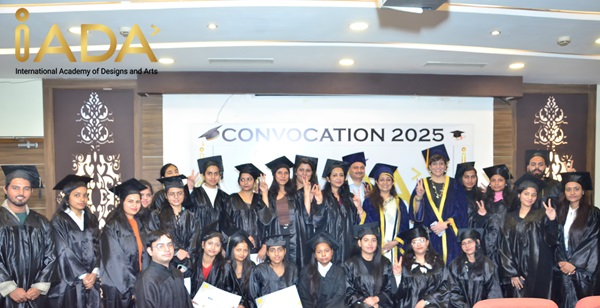
An individual who has a love for design and a keen interest in fashion opts for a career as a fashion designer. Time and again, one has witnessed several designers from the Indian fashion industry making a name for themselves on the global stage. A person’s inherent talent and desire for excellence bears fruit when they are guided by the right minds and mentors. Founded by C.A.Sudeep Bhargava and Dr. Renu Bhargav, the International Academy of Designs and Arts has emerged as one of the most reputed institutions in India which offers courses in fashion, design and arts. In the last few years, has managed to build a reputation for itself as an institution that offers students a wide range of courses in fashion designing to choose from. These courses, apart from being well-structured, are designed to prepare students to shine and register an impact in a highly competitive industry. The fashion-related courses offered by the academy are Basic Diploma in Fashion, Advanced Diploma in Fashion, , Bachelor of Design (B.DES) in Fashion -UG, Bachelor of Vocation (B.VOC) in Fashion -UG, Master of Design (M.DES) in Fashion-PG, Fashion Styling, Apparel Merchandising, CAD Fashion Design, Boutique Management, Garment Manufacturing, Pattern Making and Design & Communication. 
Talking about what makes IADA different from other institutions in this field, co-founder Sudeep Bhargava says, “Very few institutions in the world have as many Design-based courses as we do. Design is a broad term and a student should have the right to choose what they wish to study. While somebody might be interested in fashion design, another individual could be passionate about fashion styling , Interior Design or Furniture design . By offering students a plethora of courses to choose from, we ensure they pick what they really wish to study and excel in it. We are a fashion /interior designing institute in Noida which hosts students from all across the world”.
When a student wishes to study fashion, they try to find that one fashion designing institute that will not only provide them with the right education but also prepare them to do well in the professional world. Over the years, IADA has imparted education about fashion and design to a large number of students. While some of these students work with some of the most reputed fashion brands in India and abroad, there are many who have built a name for themselves as fashion entrepreneurs as well.
Elaborating on the same, co-founder Dr. Renu Bhargav states, “A large number of students, interested in job oriented courses in fashion designing, enroll with us. While education is extremely important, the things they learn in an institute should also help them secure good jobs and earn a livelihood for themselves in the future. We consciously work towards imparting the kind of knowledge and skills to our students that will enable them to get opportunities and make a mark for themselves in the professional world”.
A while after it came into existence, IADA emerged as the most reputed fashion/Interior design institute in Noida. In the last few years, it has cemented its status as one of the best fashion institutes in the country. Apart from fashion designing course in Noida, IADA also offers a wide range of courses in interior design. The institute provides students with a very healthy educational environment and offers them the opportunity to learn from industry experts.
Education
The True Meaning of 666 in the Bible: An Exploration of the Secrets of Revelation
Published
2 weeks agoon
March 19, 2025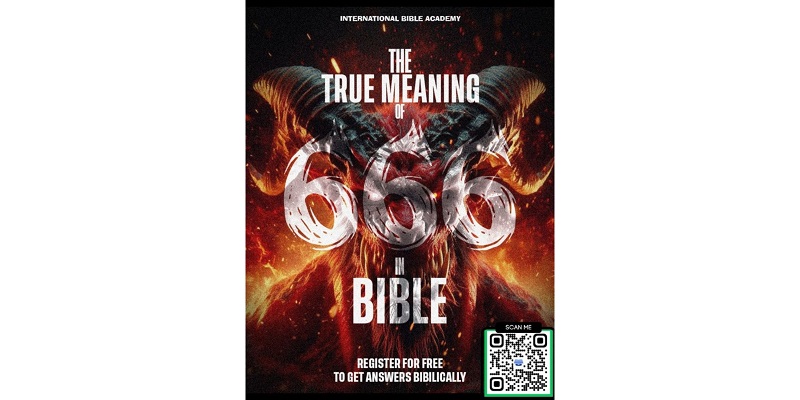
For many Christians, the number 666 carries a heavy connotation, often associated with the end times. This belief stems from its mention in the Book of Revelation. But what is the true meaning of this enigmatic number? The International Bible Academy offers a free online Bible course for Christians of all ages providing an array of resources aimed at helping Christians to develop a deeper understanding of Scripture and its application in everyday life. Among the myriad of topics explored in these classes, several stand out as particularly intriguing, reflecting the profound and sometimes perplexing nature of the Book of Revelation. Some of the interesting questions which will be explored in our course are:
- Why is it important for us to understand the prophecies in the Bible?
- What are the mysteries in Revelation?
- What is the Biblical reason for birth, sickness, aging, and death?
The International Bible Academy (IBA) offers much more in its curriculum beyond these highlights—each topic is meticulously designed to encourage critical thinking, open dialogue, and spiritual enrichment. It offers a holistic approach to mastering the entire 66 books of the Bible—from Genesis to Revelation. The sense of community formed within these online classrooms allows Christians from all walks of life to come together, share insights, and grow together in faith.
A Global movement of faith
Through this free online Bible class, participants join a global community of true believers. Currently, our course is established in over 600 locations across 29 countries, including the U.S., China, Japan, Canada, Germany, Netherland, France, Spain, Australia, Italy, Austria, Southeast Asia, India, Philippines, Hong Kong, and many more., Last year, thousands of believers from young students to experienced pastors joined us in deepening their faith.
Online classes are offered for convenient access.
The added advantage of an online format means that access to spiritual growth and learning is available at the fingertips of participants, no matter where they are situated. In addition to comprehensive teachings, the course offers interactive elements that encourage dialogue, community engagement, and personal growth. Students can share testimonies, ask tough questions, and seek guidance from knowledgeable and experienced instructors who prioritize an in-depth understanding of the scriptures. Our mission is to make biblical education accessible and engaging, and we believe these classes can play a vital role in your spiritual journey.
| Level | Duration |
| Basic Course | 1 month / twice a week / 1.5 hours |
| Regular Course | 8 months / thrice a week / 1.5 hours |
How do I enroll?
https://docs.google.com/forms/d/e/1FAIpQLSegHFTbn0pvVXdTUBzNIuDGqiUqF6_SwmJ4dcfLWT9m_JxJaA/viewform
Sign up today for free by scanning the QR code in the poster or through the below links and take the first step in revealing the deeper truths of the Bible. With an array of free online Bible classes available in various languages provided in India—English, Hindi, Tamil, Telugu, Kannada, and Oriya.
With the perfect opportunity to strengthen your relationship with God and learn His will, you can embark on a journey that promises spiritual growth, community, and a clearer understanding of your role in His divine plan. Don’t miss this opportunity!
www.internationalbibleacademy.in
Instagram ID: Light_of_zion_india
Facebook: Zion India
Testimonies from Pastors and believers in India
Our program has already transformed lives and inspired many, including Pastors in India who have shared their powerful testimonies. One Pastor stated, “I hope you learn about the path to heaven, which is the purpose of faith, and how God will fulfill the history of the last Bible.“ This sentiment speaks volumes about the urgency and significance of learning biblical truths.
Another Pastor emphasized the importance of the Book of Revelation by saying, “If you are a believer waiting for the Second Coming of Jesus, the Book of Revelation records when, where, to whom, and how He will come. If you hear the word and believe it, you can anchor your faith in the promises of Scripture.“ His message is clear: prepare your heart and mind for the glorious return of Christ by immersing yourself in His Word.
The testimonies continue to inspire even, with one of our students who shared their excitement about the teachings he had never encountered before. “I’ve never heard this word before, it’s completely new to me. Even after multiple biblical courses, enrolling at IBA revealed the Bible’s stunning record of God’s plan to deliver promised blessings.”
Disclaimer: The information provided in this article is for educational and informational purposes only and reflects the teachings and interpretations of the International Bible Academy (IBA). The views expressed herein are not intended to replace personal study or spiritual counsel but to encourage deeper exploration of the Scriptures. Biblical topics such as prophecy, the Book of Revelation, and related themes may involve varied interpretations across different denominations and faith communities. Readers are encouraged to approach these subjects with an open mind and to seek additional guidance from their respective spiritual leaders. Participation in the courses mentioned is voluntary, and the content should not be construed as official doctrine of any specific church or denomination.
Education
Fair Education is a Right – Let’s End the Exploitation!
Published
2 weeks agoon
March 18, 2025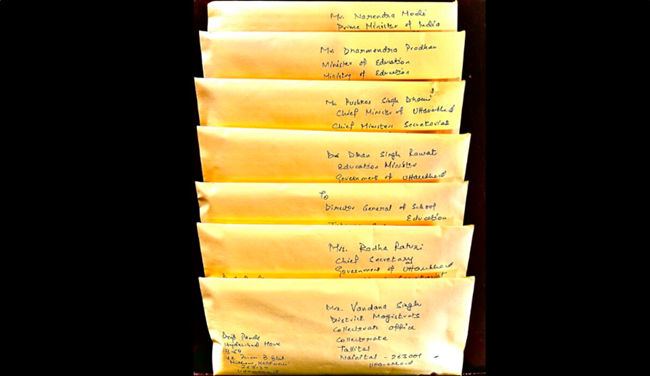
- Fair Treatment for Teachers: Proper pay, better working conditions, and the respect they deserve.
- Affordable Education for Parents and Children: No unnecessary financial burdens that keep quality education out of reach.
- Support for Government Schools – These schools are shrinking, but they are the lifeline for many children. It’s time we invest in them and give them the resources they need to succeed.
- https://rb.gy/54ryek
- https://rb.gy/dds6lq
- https://rb.gy/en9cqy
- https://rb.gy/r0uj2m
- https://rb.gy/1j4bt8
- YouTube: @Haldwani_dcp
- Instagram: @haldwani_dcp
- Facebook: @deep.chandrapande
Education
Advance Your Career with Zell Education – Your Gateway to ACCA, CFA, CMA, and More
Published
3 weeks agoon
March 13, 2025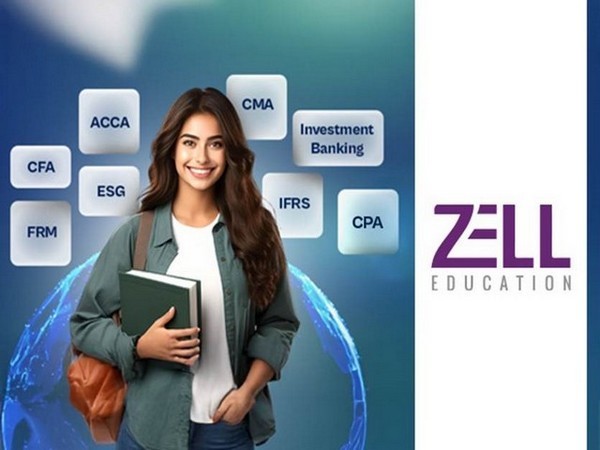
Quality education is something every Indian strives for. The desire to succeed in academics is propelled further by right guidance and mentorship. Often, an extremely hard-working student fails to achieve their goals because they are not many times, an extremely hard-working student fails to achieve their goals owing to not being guided well. Therefore, Teachers and institutions play a crucial role in a student’s academic development and successTeachers and institutions, therefore, play a crucial role in the academic development and success of a student. If an institution offers high-quality education and provides solid mentorship, the student will witness their career soar.
Founded by the visionary Pratham Barot, Zell Education has emerged as one of the leading and most reliable institutes providing finance and accounting courses that are recognized globally. Ever since its inception, Zell Education has remained committed to providing students high-quality education driven by the expertise of faculty members. The institute focuses on providing industry-relevant training that would enable students to make a mark in their professional lives.
“One of the sought-after courses at our institute is the ACCA. ACCA full form is Association of Chartered Certified Accountants, is a globally recognized certification course focused on accounting and finance. After pursuing a course in ACCA, students can work in different spheres like audit, financial management, taxation, and consulting. ACCA professionals, apart from working in public practice, can also lend their expertise in corporate and financial services. Several students, who have done the ACCA course details from our institute, are working in reputed government agencies and private organizations”, says Barot.
Along with the structured curriculum and experienced faculty members, the high success rate of the students has contributed towards the solid reputation the institute has today. Apart from ACCA, some of the other professional courses offered by the institute are CFA (Chartered Financial Analyst), CMA (Certified Management Accountant), CPA (Certified Public Accountant), Investment Banking, Financial Risk (FR) and International Financial Services (IFS).
Elaborating on what gives Zell Education an edge over other institutes, Barot states, “From the time we started, our goal has been to make things convenient and comfortable for our students. We offer flexible learning options and give our students the option to choose between offline and online learning. Our faculty members, apart from being highly experienced in the academic space, also have industry expertise. Our curriculum has been designed thoughtfully and aligns with global standards.”
For years, Zell Education has boasted of a very high passing rate. The institute provides students adequate assistance during the placement season and ensures they get professional opportunities befitting their skills, knowledge, and aptitude. Upon visiting zelleducation.com, the official website of the institute, one can get all the relevant information about the courses and certifications being offered.
Education
Manupatra Hosts Nationwide Law Teachers Conclave to Strengthen Legal Education
Published
1 month agoon
February 28, 2025
In its continued commitment to supporting the legal fraternity, Manupatra, a pioneer in legal technology, organized the Law Teachers Conclave across India’s East, West, North, and South regions in collaboration with leading law schools. This initiative aimed to enhance learning, development, and digital transformation in legal education.
By hosting the conclave at regional levels, Manupatra sought to ensure accessibility and inclusivity for educators nationwide. The conclaves were organized in partnership with:
1. West Region Law Teachers Conclave – in association with GNLU, Gandhinagar
2. South Region Law Teachers Conclave – in association with R.V. University, Bengaluru
3. North Region Law Teachers Conclave – in association with NLU, Delhi
4. East Region Law Teachers Conclave – in association with NLU, Odisha
The conclaves witnessed participation from over 1,200 law educators, including full-time, part-time, ad-hoc, and visiting faculty members from across India. These events were supported by the hosting universities and industry bodies such as SILF and GCAI.
With over 70 speakers and resource persons, the conclaves featured insightful discussions on a wide range of topics under the theme “Empowering Legal Educators for Tomorrow.”
Key Takeaways from the Conclave
The deliberations at the Manupatra Law Teachers Conclave highlighted critical challenges and advancements needed in legal education, including:
1. Integration of Technology in Legal Education – Law faculties require training in digital resources and innovative teaching methodologies to enhance student learning outcomes.
2. Pedagogical Enhancements – There is a need to transition from traditional lecture-based teaching to interactive and experiential learning, such as moot courts, case studies, and interdisciplinary approaches.
3. Practical Exposure and Industry Collaboration – Faculty members should engage more with the legal industry, including law firms, the judiciary, and corporate legal teams, to align academic teachings with real-world practices.
4. Global Competencies and Cross-Disciplinary Learning – Law schools must prepare students for international legal frameworks and develop skills in analytical thinking, project management, and professional ethics.
5. Academic Social Responsibility (ASR) – A call for stronger collaboration between academia, industry, and government to foster holistic legal education.
Recommendations for a National Capacity Building Program
In response to these observations, Manupatra is proposing a National Capacity Building Program for Law Faculty, emphasizing:
* Regular faculty development workshops and certification programs endorsed by the Bar Council of India (BCI) and University Grants Commission (UGC).
* Workshops and training sessions focusing on digital literacy, emerging legal fields, and contemporary teaching methodologies.
* A national-level digital resource hub offering curated content, research materials, and interactive teaching guides.
* Exchange programs and global collaborations to expose law faculty to international best practices.
* Mentorship programs where senior legal educators and industry experts guide young faculty members.
* Establishment of legal education research centers to enhance teaching methodologies in law schools.
* Secondment programs for law faculty to gain practical experience by working with law firms and corporations, which they can integrate into their teaching.
A well-structured, government-backed Capacity Building Program will significantly improve the quality of legal education in India and contribute to producing competent legal professionals who uphold the rule of law effectively.
Manupatra urges all stakeholders to consider this recommendation and initiate the necessary discussions to develop a framework for the Capacity Building Program. Manupatra remains committed to collaborating and providing further insights to support this important initiative.
More details https://www.manupatracademy.com/home/event
About Manupatra
Manupatra, a leading legaltech company, has been at the forefront of innovation in law and technology since 2000. Its flagship online legal research platform is the preferred tool for legal professionals, offering comprehensive legal research solutions. Manupatra also provides a suite of legal operations solutions, including contract lifecycle management, compliance management, case management, notice management, and litigation tracking.
For media inquiries, please contact: Priyanka Patel Manupatra
Email: ppatel@manupatra.com
Trending
-

 Entertainment3 years ago
Entertainment3 years agoSmall-town girl Anjali Kumari’s hottest Bollywood song “Katra Katra Again” compared to Mallika Sherawat’s
-

 Education1 year ago
Education1 year agoFostering Sustainability: Highlights and Insights from ICSE 2023
-
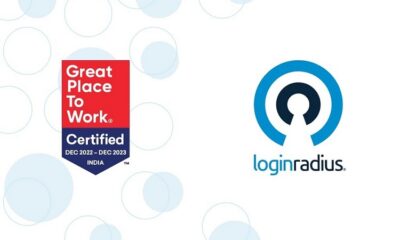
 Business2 years ago
Business2 years agoGreat Place To Work Recognizes LoginRadius as One of India’s Best Workplaces
-

 Technology1 year ago
Technology1 year agoCrewsphere & ICP’s Innovative Virtual Darshan Applauded by Deputy CM During Navratri at Mata Chintpurni Shrine